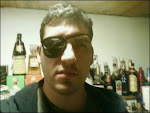This is a story about a guy who invented something that most everyone of us takes for granted - Clean water. We waste it all the time but there's places on this planet that don't have access to a great deal of it.
So this kid invented a wind-up water purifier that could be produced cheaply enought o make it available where legit water isn't. He won the UK leg of the James Dyson awards so that could help with funding or whatever.

What a dorky looking photo, but the kid's product is legit.
The water bottle contains two chambers. Dirty water is put in an outer chamber and the inner chamber is plunged through it, filtering water particles as small as four microns.Yes, why don't we mark it up 400% and sell it to 3rd world nations. Sorry dude, they're already spent all their money on wind-up laptops. So the market is totally tapped.
Once filtered, the water is sterilised by a wind-up ultraviolet bulb in a process lasting 90 seconds.
A prototype was effective in killing 99.9% of bacteria and viruses.
I really don't understand how ideas like this and the solar-powered stoves in India don't get more press and money. It's so simple, technologically cool, and most of the time these companies die a sweet death of lack of funding within a few years.
I guess it's because the amount of money they can make investing in technologies that help the third world is a big fat zero.
Especially because most of these super amazing technologies have no practicality in the developing world, either by being ridiculously expensive (olpc) or electronically/mechanically complex.
I guess this one will die simply because it's much like a printer. Sure, the actual printer is cheap, it's really the ink that cost a lot. You need a steady supply of 4 micron filters which would need to be replaced every unspecified amount of time.
Then how long does the UV bulb last for? How mechanically sound is the bottle from breaking, especially all those small pieces in it. How long would it take to get a viable amount of water cranked for cooking or bathing?
It's a great invention on paper and does seem like a great invention for first wold tourist who think that chlorinated or iodated water tastes icky. But then again, they already have that:
The Pure bottle is the brainchild of Timothy Whitehead, a design and technology graduate from Loughborough University, who had the idea while travelling in Zambia.
It eliminates the need for chlorine and iodine tablets which take 30 minutes to work and can leave an unpleasant taste.
The invention will now go forward to the awards' global final in October.
Mr Whitehead said: "I thought that there must be a way of using new technology to clean drinking water. I began experimenting with using ultraviolet light to sterilise water quickly, without any distortion to taste."




No comments:
Post a Comment